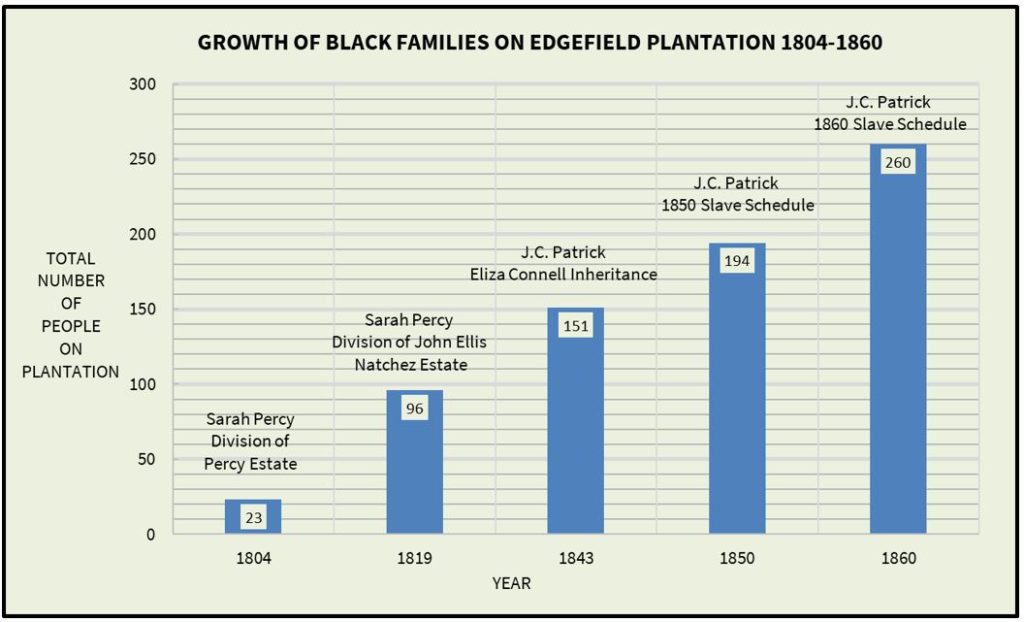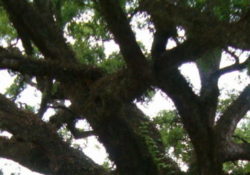Part 10 (Final). The Black Families of Edgefield – A 100-Year History
The 100-year history of the Black Families of Edgefield is just one of the untold stories of Africans enslaved on early Mississippi plantations. The beginnings of the Edgefield community trace back to 1776 when Charles Percy first arrived in Woodville with an estimated nine enslaved Africans. Percy later purchased Africans off ships arriving from Africa and the Caribbean Islands, and he acquired others from the upper South U.S domestic slave trade. In previous discussions I have mentioned the likely African origins of three of the earliest Edgefield ancestors.
• Hamlet Percy – Igbo people from present day Southeastern Nigeria
• Congo Minor – Kongo nation from present day Congo
• Quaquo [Kwaku] – Akan & Ewe people from present day Ghana
The growth of the three earliest Edgefield families started with the distribution of twenty-three people to Sarah Percy in the division of the Charles Percy estate. Sarah Percy inherited more enslaved people after the death of her first husband John Ellis of Natchez. After she died, her second husband Nathaniel Ware sold the plantation and enslaved people to John Connell. After Connell’s death, his widow Eliza Chinn of Kentucky married J.C. Patrick.
After 1843 there were no estate inventories containing the names of those enslaved on Edgefield but the 1850 and 1860 U.S. Federal Slave Schedule for J.C. Patrick lists a total of 194 and 260 enslaved individuals, respectively. In 1860 J.C. Patrick became one of the largest slaveholders in Wilkinson County.

I have identified the households, families, and interrelated community of Edgefield. The personal stories of these enslaved persons are not known but the conditions under which they lived is clear. Forced into family unions and work groups, these families, with some individuals coming from advanced agricultural societies in Africa – cleared the forest, plowed the soil, and planted and harvested the indigo and cotton crops. After emancipation they emerged from 90 years of chattel slavery on the same plantation with family names and family structures in place.
1876
The large growth of the formerly enslaved families on plantations like Edgefield resulted in Black people comprising 80% of the population in Wilkinson County in 1870. With a one-man one-vote system and a unified effort to use the voting system to overcome the vestiges of enslavement, Black people immediately began to choose their own representatives in political offices, advocate for free public schools, and demand fair wages as paid laborers. But, in 1876, the white supremacist forces, led by ex-Confederate soldiers, murdered, intimidated, and fraudulently took away the voting rights of the Black majority in Wilkinson County, Mississippi and throughout the South. In 1876, the Edgefield community would not only lose the political and educational gains it made over the past 10 years, but also suffer the loss of important community and family members as well.
Finally, a return to the community memory passed down by Samuel Booker Minor, great-great-grandson of Congo and Sally Minor, for a concise history of Edgefield.
“Now listen! They tell me in slavery time this Edgefield track of land here, this section of land, you know the government was letting it out to them soldiers, and this here fellow from West Baton Rouge, this Edgefield track of land was deeded to him.
You know it just went from family to family until Dr. Patrick came from New York [S.C.] and married a widow and he [Patrick] came into possession of it. Well, the Percy’s, they come here, they was the ones brought his half-white/colored family with him on an ox-wagon from West Baton Rouge.”
And now the descendants of the Edgefield Black Families — Blake(s), Minor, Percy, Turner, Plains, Anderson, Henderson, can call the Edgefield ancestors by their names so that they will always be remembered.



Good read. Thank you.
Thanks Marlon.
Excellent blog Alvin. I am also researching Hendersons. What’s next for you. I can’t wait to read more Wilkinson County History.
Gerri thanks for reading and commenting on all the blogs. I have a few short blogs to complete. Then I will complete my research and writing on 1876 that I discuss in Part 10.
Thanks Gerri.
Always interesting and informative to learn about our families’ histories. Have you concerning publishing your research? It would be great to have “Black Families of Edgefield Planation – Woodville, Mississippi” in print so that our families’ history can be past to future generations.
Have you considered researching the Black families on the Percy Plantations in West Feliciana Parish, Louisiana?
Thank you for your dedication to tell and to write about our history.
Thanks Gwen for following the blog series. I have not considered researching the Black families on the Percy Plantations in West Feliciana Parish, Louisiana at this time. As you know, Charles Percy’s son Robert Percy and his descendants owned Beech Grove and other plantations in Louisiana. Hopefully, someone can piggy-back on the history I have presented and start the work.
Thank you!! I guess this is the end of the Edgefield saga
Marlene. This is the end of the series on the first 100-year history of The Black Families of Edgefield. This leads up to the research and writing on Edgefield in 1876.
Alvin have enjoyed your writings, and this piece as well. Thanks for sharing this amazing research on your family.
Thanks Cynthia.
Excellent work summarizing the journey. I look for to your 1876 writing and your future book on the 1st 100.
Thanks Vernita. I appreciate your support.
Great work.
Thanks Shelley.
Excellent blog series my friend! Looking forward to whatever is next🤗!
Thanks Sherre. I’m working on it.
Excellent research and history!
Thanks for reading Denise.
Much more of our History will reveal itself through research!
Yes it will. Thanks for reading Ernest.
Hi Alvin,
I’m Ernest Maiden Johnson born in Crosby, Mississippi with ancestor roots in Wilkinson County/Woodville. Related to Aunt Bea Minor through her Maiden lineage and the large Maiden family in Mississippi, Louisiana, and East Texas plus southwest Arkansas.
Finally a classMate and next seatmate to Mrs. Susie Minor Boudreaux. Very interested in this History.
Hey Ernest glad to meet you. Please subscribe to the blog and email me if you have any questions or anything to add.
What a blessing. Thank you, cousin, for all the research, but mostly thank you for sharing! These stories should never be lost.
Dianne thanks reading and for your encouragement. Please subscribe to the blog and let me know if you have any questions.
Alvin I haven’t been on your blog in a while but I want to commend on your outstanding research. I finally got an opportunity to list to your podcast today, it was helpful for me to venture out in another direction for the search on the Stewart’s, Bethley s and Gaines of Wilkinson County Mississippi.
Dwight thanks for taking the time to read through my blog and sending me your comments. I am still grinding through the documents. Give me a call whenever you want to talk.
Ashe
Thank you Mr. Blake for this history lesson. I happened upon this blog in search of the Turner family from Lake Mary in Woodville, MS as told to me by my mother. I recognized the name Lettie, cousin Lettie as I remember.
I always wonder how did my family become educated during those times. My great-grandmother was educated, her 3 children went to college and so on.
Thank you for you curiosity and perseverance!!!
Rochelle I am so glad you discovered my blog. In part 9 of this blog series I talk about the arrival of the Turner Family from Virginia after their 2 children were sold away. After 1865, education was of the highest importance for our
ancestors, and despite terrorism and opposition, Woodville has a long history of excellent educators. Send me a Facebook friend request so I can discuss more with you. Thank you for your support.
I’ve enjoyed your research very much and the history it includes. Thank you. I missed part 1and part 6. How do I find them?
Hmmm. I am not sure why you missed part 1 & 6. I just checked and they are there. Try going to the archives menu or go to the bottom of Part 2 and click to the left. Here is the link to Part 1. https://almostdisappeared.com/black-families-of-edgefield-plantation/
Mr. Blakes,
Your thorough research was time well-spent.
This is a very informative and well-written historical account of your family.
Thank you for sharing!
Thanks for reading Mrs Turner.
Hello,
My name is Marvlieu Jolla Hall. My mom’s maiden name was Bethley. In trying to locate a pic of my maternal grandfather. Keller Bethley, I ran into your published research online. My mom was Mrs. Surfronia Bethley Jolla; and my dad, Dudley Jolla, Sr. I am so appreciative of your research and looking forward to reading it all. I was born in Woodville, lived in Nola, Dallas, and now New York.
Marvlieu, thanks for reading and sending me a comment. I am so glad you contacted me. Keller Bethley’s father, your great grandfather, Anderson Bethley gave a deposition in 1930 so that my great-great grandfather Phil McWhorter could receive his Civil War pension. I sent you a FB friend request. I have some documents to share with you.
Hi,
My name is Ledarrious Wells. I am related to the Cains, Mcquirter, Wells, and Argue of Woodville Ms. Would you have any info on these families or my great great great grandfather Joseph Mcquirter. Thanks.
Hey LeDarrious! Thanks Cuz for reading and commenting on my blog. I have written and talked quite a bit about the McQuirter family who were enslaved by the McWhorters of Alabama and brought into Woodville in the early 1800s. I am proud to tell you that our ancestor Phil McQuerter (born 1844) was a Civil War Veteran who fought in the 81st regiment US Colored Infantry. Listen to the podcast here – http://almostdisappeared.com/resources/blogtalk-radio-episode-the-civil-war-pension-file-of-phil-mcwhorter/. If you want to discuss further email me at alblakes1@gmail.com.
The more I read, the closer I get to my breaking point. These truths are too familiar, so I will digress and continue when I am in a better place.
Wow, a great deal of research presented in an interesting light. Thanks for sharing. I am working on building slave related data from Mississippi into the WikiTree One World Tree. Let me know if you have any concerns with using any of your material. Of course I would list this website as a source, so others could learn more. I would also “specially acknowledge your research”. I’m curious if you have an Edgefield “gedcom” that you could share. I have a couple questions that I’ve been unable to find answers and hope you can respond.
1. When did the name Edgefield plantation start being used? It looks like after Sarah inherited the 20 enslaved people – so sometime after 1804 – is this correct?
2. I could not find Isabel in the inventories, was she listed under a different name or am I needing a new pair of glasses?
I’m sure I’ll have more after I’ve digested the data more.
Thank you again,
Mary